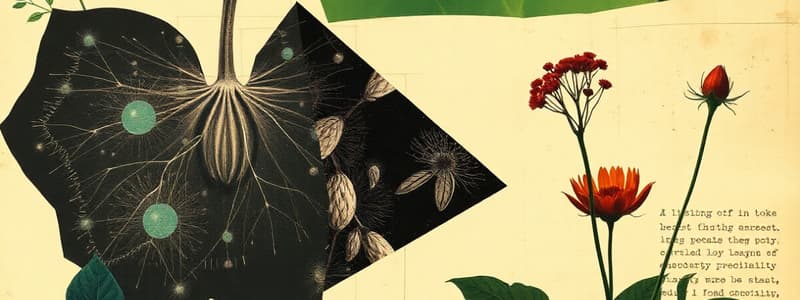Podcast
Questions and Answers
Which factor does NOT influence the photosynthetic rate?
Which factor does NOT influence the photosynthetic rate?
- Temperature
- Carbon Dioxide Concentration
- Soil pH (correct)
- Oxygen Concentration
What is primarily stored by plants for later energy use?
What is primarily stored by plants for later energy use?
- Glucose
- Fructose
- Sucrose
- Starch (correct)
How does temperature affect enzyme activity in plants?
How does temperature affect enzyme activity in plants?
- All temperatures increase enzyme activity equally
- Optimal temperatures increase enzyme activity, while high or low temperatures decrease it (correct)
- Enzyme activity is not affected by temperature changes
- Low temperatures speed up enzyme activity considerably
Which statement about oxygen concentration is correct?
Which statement about oxygen concentration is correct?
What role does water play in photosynthesis and respiration?
What role does water play in photosynthesis and respiration?
What is the primary role of chlorophyll in photosynthesis?
What is the primary role of chlorophyll in photosynthesis?
During which part of photosynthesis is ATP generated?
During which part of photosynthesis is ATP generated?
How do the products of photosynthesis serve respiration?
How do the products of photosynthesis serve respiration?
What occurs in the stroma of the chloroplast during photosynthesis?
What occurs in the stroma of the chloroplast during photosynthesis?
What type of reaction is cellular respiration categorized as?
What type of reaction is cellular respiration categorized as?
What factor has the greatest impact on the rate of photosynthesis?
What factor has the greatest impact on the rate of photosynthesis?
What happens at night when photosynthesis stops in plants?
What happens at night when photosynthesis stops in plants?
Which of the following statements describes the relationship between photosynthesis and respiration?
Which of the following statements describes the relationship between photosynthesis and respiration?
Flashcards
Photosynthesis
Photosynthesis
The process by which plants convert light energy into chemical energy, producing glucose.
Respiration
Respiration
The process by which organisms break down glucose to release energy.
Carbon dioxide and Photosynthesis
Carbon dioxide and Photosynthesis
A higher concentration of carbon dioxide typically leads to increased rates of photosynthesis.
Temperature and Photosynthesis/Respiration
Temperature and Photosynthesis/Respiration
Signup and view all the flashcards
Glucose Storage in Plants
Glucose Storage in Plants
Signup and view all the flashcards
Chloroplasts
Chloroplasts
Signup and view all the flashcards
Light-dependent reactions
Light-dependent reactions
Signup and view all the flashcards
Light-independent reactions (Calvin cycle)
Light-independent reactions (Calvin cycle)
Signup and view all the flashcards
Glycolysis, Krebs cycle, electron transport chain
Glycolysis, Krebs cycle, electron transport chain
Signup and view all the flashcards
Interconnected processes
Interconnected processes
Signup and view all the flashcards
Factors affecting photosynthesis
Factors affecting photosynthesis
Signup and view all the flashcards
Study Notes
Photosynthesis and Respiration
- Green plants utilize sunlight to convert carbon dioxide and water into glucose (a sugar), a process called photosynthesis. This process releases oxygen as a byproduct. The chemical equation for photosynthesis is 6CO₂ + 6H₂O + light energy → C₆H₁₂O₆ + 6O₂.
- Photosynthesis takes place primarily in chloroplasts, organelles within plant cells that contain the green pigment chlorophyll, which absorbs light energy.
- Light-dependent reactions occur in the thylakoid membranes of the chloroplasts, capturing light energy and producing ATP and NADPH.
- Light-independent reactions (the Calvin cycle) occur in the stroma of the chloroplasts, using ATP and NADPH to convert carbon dioxide into glucose.
Respiration in Plants
- In respiration, plants break down glucose (or other sugars) in the presence of oxygen to release energy in the form of ATP. This energy fuels various cellular processes. The equation for respiration is C₆H₁₂O₆ + 6O₂ → 6CO₂ + 6H₂O + ATP.
- Plant respiration occurs continuously, day and night, in all living plant cells.
- Respiration is a catabolic process (the breakdown of complex molecules), involving multiple enzymatic steps that release energy.
- Cellular respiration has three main stages: glycolysis, the Krebs cycle (citric acid cycle), and the electron transport chain.
Relationship between Photosynthesis and Respiration
- Photosynthesis and respiration are interconnected and complementary processes. Photosynthesis produces the glucose that respiration breaks down to release energy.
- The products of one process are the reactants of the other. This reciprocal relationship is fundamental to the carbon cycle in ecosystems.
- During the day, if photosynthesis exceeds respiration, the plant increases its net glucose production, storing the excess as starch.
- At night, when photosynthesis stops, respiration uses stored starch for energy.
Factors affecting photosynthesis and respiration
- Light intensity, carbon dioxide concentration, and temperature are key factors influencing photosynthetic rates.
- Light intensity is essential because chlorophyll needs light to initiate electron transfer and produce ATP and NADPH. Higher light intensity usually leads to faster photosynthesis.
- Carbon dioxide is the main source of carbon in the Calvin cycle. Increased carbon dioxide generally boosts photosynthetic rates.
- Temperatures are vital; optimal temperatures promote enzyme activity in both processes. Extreme high or low temperatures can slow down both processes.
- Oxygen concentration affects respiration rates. Higher oxygen concentrations usually lead to higher respiration rates, excluding factors like toxins.
- Water availability impacts both processes, affecting cellular functions, structural integrity, and cooling. Water uptake is crucial for both chemical and structural processes in plants.
Storage Products
- Plants store excess glucose as starch.
- Starch is stored in various plant parts (roots, stems, leaves) for future energy use.
Studying That Suits You
Use AI to generate personalized quizzes and flashcards to suit your learning preferences.




